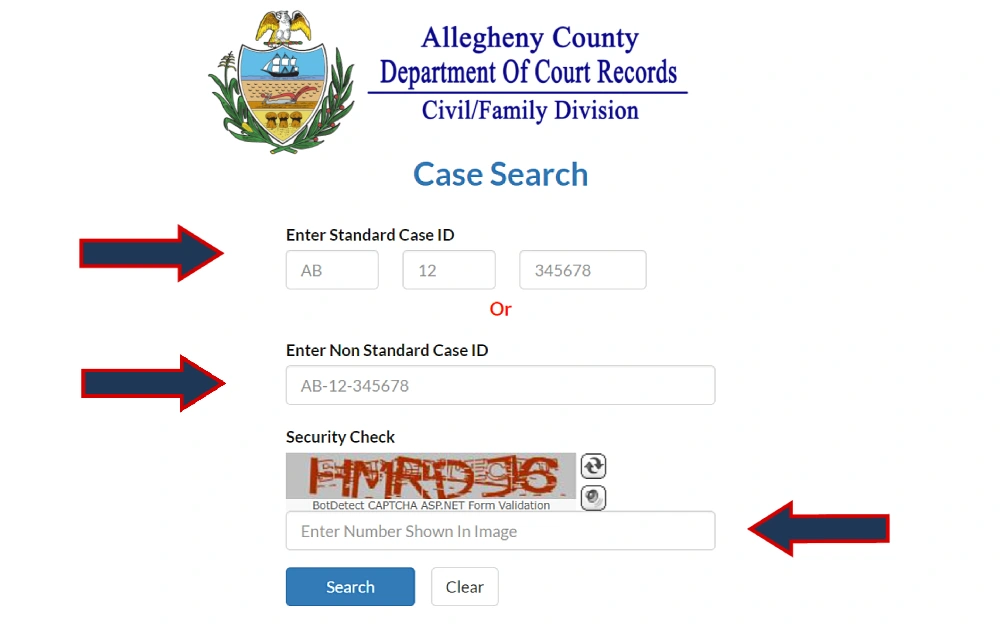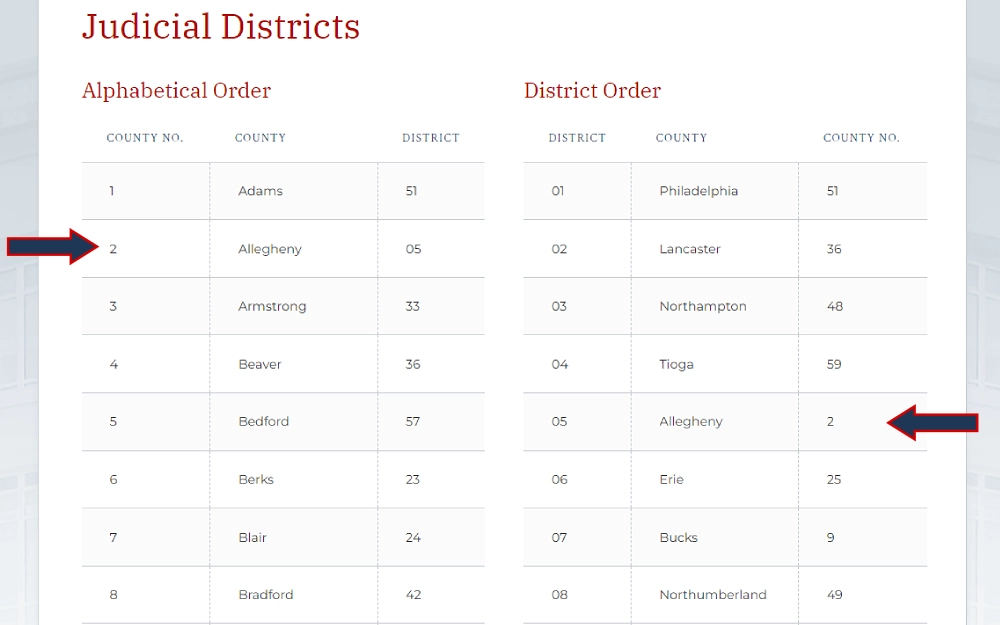Look up free Allegheny County divorce records and establish the facts about anyone’s marital status. There are many reasons someone would need details on divorces or dissolutions of marriage, and searchers should never have to explain themselves.
Pennsylvania’s Right to Know Law dictates that records that could be of public interest should be readily available to those seeking it. Because that law exists, local government agencies have to facilitate access to information and provide it to searchers free of cost.
This streamlined resource will present readers with all the tools available to conveniently find information about divorce records in Allegheny County, Pennsylvania.
How To Conduct a Free Allegheny County Divorce Records Search
Divorce records are public in Allegheny County, and any concerned individual is able to look up and uncover information about a person’s marital status. The Case Record Search Tool provided by the Allegheny County Department of Court Records gives access to public divorce records.1, 2

This tool requires users to create an account before starting their search.
The registration involves sharing personal information such as email, phone number, address, etc. Users are also required to create a username and password.
After the new account is created, users can start searching. Making inquiries is free, and there’s no limit to the number of searches someone can do.
The Case Search System shows information for all kinds of cases handled by the court. It’s important to make the correct choices to find relevant data about divorces in the area. This is a suggestion of how to run an effective search.
First, users should click on “Search”, followed by “Case Search”. Then, unless they know the case number they wish to check out, users should click on “Search Using Litigant Name” and “Search All Records”.
The system allows searches using only a last name. However, having a full name (or at least a first and last name) will lead to more accurate results.
Also, searchers can choose to look at family cases only and, within this pool, focus exclusively on divorces. Since this tool is complex and full of possibilities, it might also be recommended to try different combinations and options until the searcher finds a way that makes more sense to them.
Results will show all the details about the case and, in some instances, even an image of the divorce decree (which may be redacted, depending on the facts of the case). It’ll show when the decree was issued and if the case remains open or pending.
The downside is that the online results won’t lead to official copies. When merely looking at the information is sufficient, this free tool is all the searcher needs. At the same time, if copies are needed, interested people must take another step and work with the Department of Court Records directly.
This is their contact information:
Allegheny County Department of Court Records
Civil & Family Division
414 Grant Street – City-County Building 1st Floor
Pittsburgh, PA 15219
Phone: 412.350.5729
Only certified copies of dissolution decrees are available to be ordered, and they cost $20 each. The Department of Court Records has a full fee schedule online in case more services are needed.3

The state of Pennsylvania stopped recognizing common-law marriages in 1997. Therefore, only relationships established before that date would be acknowledged as such. However, anyone in a common law marriage who decides to separate must go through a proper divorce.
In other words, there is no common law divorce. Consequently, divorces derived from a common law relationship would show up on the search, just like any other marriage dissolution would. Searchers can rest assured that they’d be able to access that information.
How To Access & Acquire Divorce Records in Pennsylvania as a Whole
In Pennsylvania, divorce records are kept by the local courts, and interested citizens must work with them to obtain the copies they need. There is no centralized tool at the state level or resources at the municipal level that would allow someone to run an efficient search.
Although there is no state-wide online source of information about divorces filed in Pennsylvania, the Unified Judicial System provides a full list of Judicial Districts that people can use to start their search.4

If the county where the divorce was filed is known, this list is a very good starting point for any search.
However, if the county where the divorce was filed is unknown, there’s no need to give up the search. Here are some tips on how to tackle the challenge:
- If the parties who divorced live in Allegheny County, expand the search to its neighboring counties, like Armstrong, Beaver, or Westmoreland;
- Think about the places the couple has lived in the past, even before they got married. The divorce may have been filed at that location;
- Consider looking at the counties the former couple has a connection with, like where they work, where their parents live, where they got married, etc.
When the search is focused on historical or genealogical records, the State Library of Pennsylvania may be a good resource.5 Considering the challenges of looking for documents from the past, being able to work with a librarian, for example, has plenty of value.
The State Library reinforces the fact that historical records starting in 1804 are kept by the counties and their Court Records Office. They may have resources like a divorce index, for example, as well as other collections from that time, but it’s clear that working with the counties might be more convenient.
However, they may be able to help with information about divorces from before that date, which are rare and could be harder to find. Whatever the time frame and how difficult a search may be, people should never hesitate to seek out help and contact the State Library if they need to.6 The library’s contact information is listed below:
State Library of Pennsylvania
607 South Drive Forum Building
Harrisburg, PA 17120
Are Details of Divorce Accessible to Everyone in Allegheny County?
Divorce records are considered public in Pennsylvania and, consequently, are readily available to the population in Allegheny County. With no questions asked, any interested individual can search for information, as well as request copies of documents they may consider relevant to them. Readers who need divorce records should never hesitate to seek them out.
The public records law in Pennsylvania is known as the Right-to-Know Statute.7 It establishes that public records must be accessible to people in the state, and local agencies aren’t allowed to make any search difficult or limit the amount of information an individual may obtain.
In Allegheny County, perhaps because records can be accessed for free using the Case Search System, searchers can order only certified copies of marriage dissolution records, like a divorce certificate.
Also, anyone searching for reliable information should be aware that divorce papers aren’t the same as records. When someone wants to leave a marriage, they file for divorce with the courts, and the other party is notified of the proceedings with papers. This set of documents provides information about what’s ahead and what will need to be sorted out: child support, division of assets, etc.
Someone who’s been served papers has no records to retrieve because their court proceedings are still in progress. Divorce records (decrees, certificates, or whatever else) only become available after the judge has finalized everything. Therefore, open or pending divorce cases won’t likely have records either.
Whatever the situation, it’s quite important to be able to access information about a divorce. Be it ongoing or finalized, citizens interested in it for whatever reason should be able to access information, review it, and come to their own conclusions about what they find.
Anyone should be empowered and feel entitled to search for Allegheny County divorce records whenever they need to understand more or clarify an individual’s marital situation. This resource covers the tools and resources available so that people in Allegheny County can do that effectively, for free and without any hassle.
References
1Allegheny County Department of Court Records, Civil/Family Division. (n.d). Case Search. Retrieved February 09, 2024, from <https://dcr.alleghenycounty.us/Civil/LoginSearch.aspx>
2Allegheny County Department of Court Records, Civil/Family Division. (n.d). Civil and Family Court Records. Retrieved February 09, 2024, from <https://www.alleghenycounty.us/Government/Court-Related/Civil-and-Family-Court-Records>
3Allegheny County Department of Court Records, Civil/Family Division. (n.d). Family Division Fees. Retrieved February 09, 2024, from <https://www.alleghenycounty.us/Government/Court-Related/Civil-and-Family-Court-Records/Fees/Family-Division-Fees>
4Pennsylvania Supreme Court, The Unified Judicial System. (n.d). Judicial Districts. Retrieved February 09, 2024, from <https://www.pacourts.us/courts/courts-of-common-pleas/judicial-districts>
5State Library of Pennsylvania. (n.d). Vital Records. Retrieved February 09, 2024, from <https://www.statelibrary.pa.gov/GeneralPublic/VitalRecords/Pages/default.aspx>
6State Library of Pennsylvania. (n.d). Location and Directions. Retrieved February 09, 2024, from <https://www.statelibrary.pa.gov/Pages/Location-and-Directions.aspx>
7Commonwealth of Pennsylvania, Office of Open Records. (2022, April 18). Right-to-Know Law Statute. Retrieved February 09, 2024, from <https://www.openrecords.pa.gov/Documents/RTKL/PA_Right-To-Know_Law.pdf?pdft=20220418>
